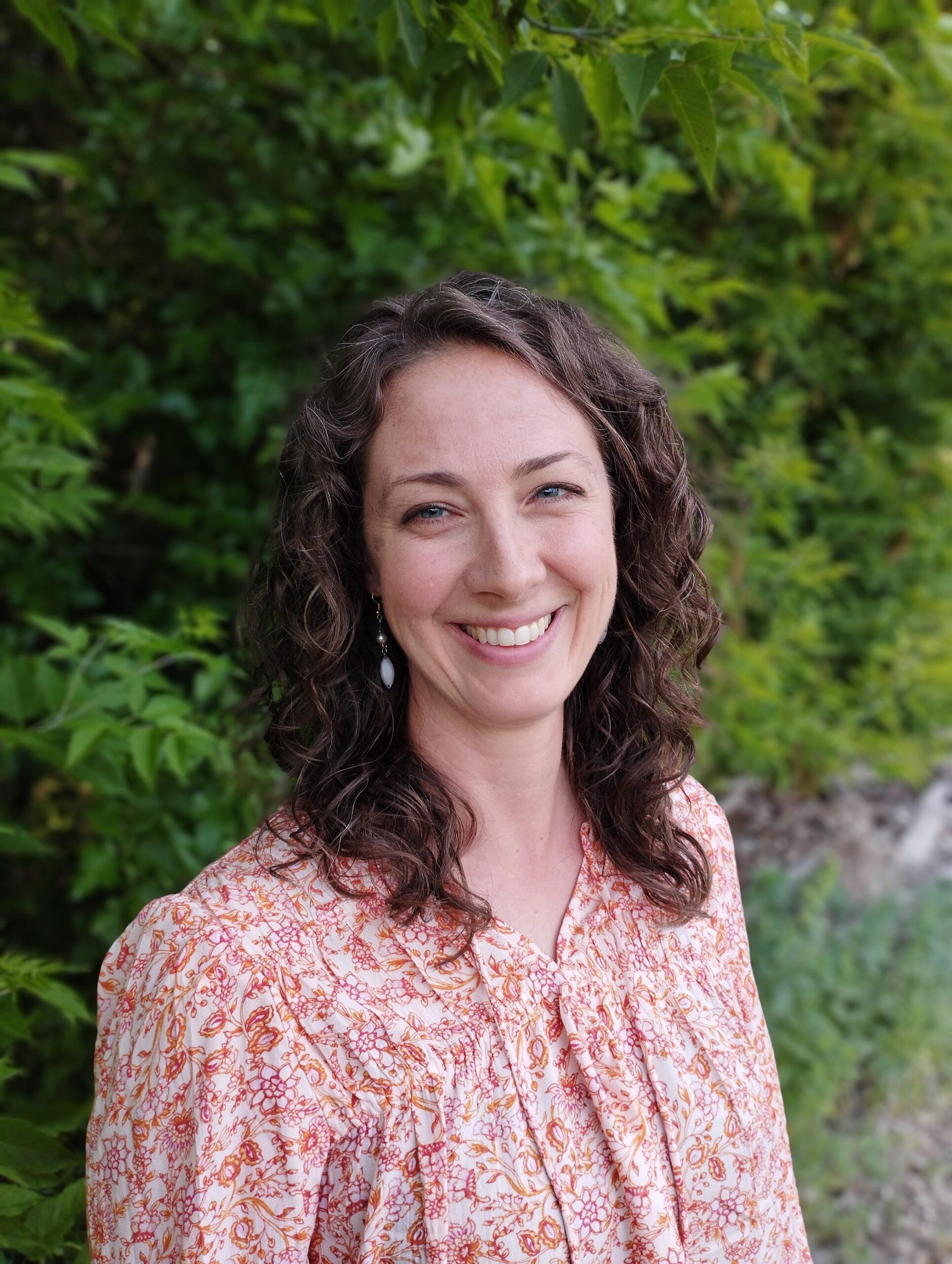It’s January, and the days are dark. We eat breakfast by dark windows reflecting our sleepy faces, and it’s dark again while I cook dinner. I light candles, leave the twinkle lights up through Epiphany and beyond. The world draws into itself, hunkering down. Tiny seeds sleep under frozen earth, unaware they await transformation into lithe green beings hungry for light.
At bedtime, my daughter reluctantly closes her eyes and gets ready for sleep, dreading the journey into the dark. We focus on her breathing: in for 5 counts, hold for 4, out for 7, listening to the ticking of her little clock. I read part of Psalm 7, about God being a shield that keeps us safe. “What image comes to mind?” I ask.
“Three children in a field,” she says, “surrounded by a huge shield — heavy as metal, strong like stone.”
“What else is inside the shield?” I ask, curious.
“A tree,” she says, “a big tree, with lots of different kinds of fruit, all the kinds — pomegranate, mango… You can pick any kind of fruit you want and eat it.”
I smile. “That’s beautiful, sweetheart.” She smiles back, tremulous. She wants all doors open, her bedroom, the kitchen, the door to the living room where my husband and I sit in the evening. She says closed doors make her feel cut off. I turn off the kitchen lights so they don’t blaze into her room. We lower the TV volume and try to talk in hushed voices.
It’s 10:45 pm and we’re brushing our teeth, when a little voice comes from the darkened room. “Mom?” A quaver. She’s woken up, disconsolate. She already knows re-settling will be harder this time, now she’s had some sleep. The scary, uncharted waters between awake and asleep threaten to engulf again. I sit on her bed, rubbing her back, and we talk about imagination. “Imagination,” I say quietly, “is one way God made us in His image. Animals don’t have imagination, only human beings. You can journey with Jesus into a story—“
She cuts me off, “but it’s scary! I don’t like going into a story, I don’t know what’s going to happen!” I suddenly envision monsters emerging from forests, and I understand.
“But Jesus made your mind, and He loves you. He won’t let anything scary come into the story. You and He are King and Queen, you get to decide.” She’s quiet. “Like, let’s say a big scary bear came out of the forest. What do you think Jesus would do?”
“He could kill it…”
“He could. But remember, He made the bear…” A pause. “Is there anything else He could do?” Another pause.
Then, hesitant, “He could make it friendly?”
“He could. He could make it into a kind bear, and you could have blueberries together, like in The Quiltmaker’s Gift.” A thoughtful pause. “When Jesus lives inside you, your imagination becomes holy. You can journey anywhere you like and you don’t have to be afraid of the dark, because Jesus will be with you.”
“But I feel like I’m all alone in the dark,” she weeps quietly, the brokenness in her voice piercing my heart, “and there’s a light somewhere, but I can’t find it.” In my mind’s eye, a pinprick of light, far off, in a sea of thick swirling darkness.
In his song “Come Back Soon” Andrew Peterson sings, ”We wait in the dark in the womb of the world | we beat our fists on the door | we cannot see in the sea that swirls | are we alone in this great darkness?” [1] The drums throb. My heart aches with the weight of the question.
“Joy to the world!” we sang in December, “The Lord is come! Let earth receive her king. Let every heart prepare Him room.” Preparing room doesn’t only happen during the season of Advent; it happens as we approach Lent, too. In the darkness of Advent, we turn inward to the womb of our hearts, making room to remember the birth of the Light of the World, the Seed of Redemption, into our universe. In this brief liminal space before Lent, we prepare again to turn inward to take stock of the cluttered accumulation of sin in ourselves, welcoming a stripping away, a lightening, a simplification of soul, making ready to remember the brief extinguishing of that Light on, the death of the Seed.
Remembering His death makes the resurgence of light and life from the empty tomb freshly brilliant. But before that moment of Easter light comes the peeling back of layers, the concentrated and careful Lenten descent into the dark places within oneself, as Gershon does at the end of Chaim Potok’s novel, The Book of Lights. Gershon is mourning his friend, whose death seems senseless and random. The darkness has hovered always at the edges of Gershon’s life, whispering, wheedling, and Gershon hardly knows how he resists it, how he doggedly keeps on in the face of encroaching despair. He doesn’t understand or experience pleasure in the effects of his life on those around him; he simply speaks, or reads, or prays, or tries to pray, or fills out paperwork, or builds a chuppah, or hosts a festival, almost without knowing what he is doing. When others applaud or affirm him he is bewildered.
But somehow, what seem to him like useless and meaningless acts result in a gradual spreading of light — to the men he serves as chaplain in Korea, to his friend Arthur who labors under guilt as the son of the physicist who helped create the atomic bombs that ended World War 2, to his frail aunt and uncle, to his girlfriend Karen who, despite ambiguity about their future together, weeps and clings to him when he returns from service, as though the darkness of his absence has allowed her to appreciate his gentle, steady light.
In the final pages of the story, Gershon sits on the tar-paper roof of his uncle’s tenement house in Brooklyn with his head between his knees, making that slow, determined descent into himself. What does it all mean? he is asking. What is it all for, in the end?
In his deepest core, he hears his friend Arthur’s voice saying, There must be something we can say or do, dear Gershon. There can’t be nothing. The voice of the darkness, mocking. Then, from beyond himself, Gershon hears the Aramaic words of the Kaddish, the prayer of mourning for the dead, the sacred public affirmation of God, a prayer made meaningful by the response.
In Hiroshima, Gershon found Arthur brokenly reciting the Kaddish at the atom bomb memorial, and Gershon himself had provided the necessary response, Amen, echoed faintly by a Japanese couple standing nearby. Now, Gershon hears, as if from far away, the ancient words blessing God who created all things, and the voice of darkness, derisive. Interrupting the darkness, Arthur’s faint voice responds, Amen. No, says Gershon, No Arthur, this Kaddish is for you, for us, for all the broken ones of our generation and the ones to come… You must not answer, Arthur. Others must answer. The reader’s heart is pricked.
Gershon continues the prayer, pausing for the response, and again, Arthur’s voice responds quietly, Amen. No, says Gershon. Others must answer. The reader’s heart stirs with a faint, Amen, of our own. With Gershon, we bless God, the Creator of the universe, we bless him blindly, without understanding; we bless Him in the darkness of our grief; we bless him unknowing, unseeing, unable to comprehend how the pieces will fit together. We bless with Gershon, who is no longer alone in the darkness. Amen, we say, weeping, palms turned up in a gesture of either willing surrender, or helpless resignation — each reader must decide. [2]
Are we alone in this great darkness? Gershon asks the same question as he recites Kaddish for Arthur, who himself howled the question as he recited Kaddish for the victims of the bomb his father helped make. My sweet girl asks it at bedtime. I ask it too, when I can no longer ignore the pressing ache of everything broken around me. Where is the light?
Here’s what changes everything. That pinprick of light, far off, chose to come close, close enough to pierce the darkness. The light shines in the darkness, and the darkness has not overcome it. [3] God has written Himself into His own story. Hope during the process of being remade unfurls from a seeded awareness of the Light, inhabiting the dark womb of our soul.
As Scott Cairns writes in his sonnet “Annunciation”,
“we all become
the kindled kindred of a King whose birth
thereafter bears to all a bright nativity.”[4]
The Light of the world has come, and He is making all things new.
![]()
[1] Peterson, Andrew. “Come Back Soon”. Light for the Lost Boy. Centricity Music, 2012.
[2] Potok, Chaim. The Book of Lights. Ballantine Books, New York, 1981.
[3] John 1:5, NIV.
[4] Cairns, Scott. “Annunciation.” Quoted in Malcolm Guite’s Waiting on the Word: a Poem a Day for Advent, Christmas and Epiphany. Canterbury Press, London, 2015.
The featured image is courtesy of Julie Jablonski and is used with her kind permission for Cultivating.
A writer, songwriter, and amateur music producer, Carolyn holds a Bachelor of Music from Wheaton College, where she pursued her twin passions for music and spiritual formation. Living overseas for the past twenty years has given her a keen interest in the connections between the inner life, the craft of making, and the art of sojourning, especially how tending her own soul affects her ability to tend the souls of others. Carolyn has contributed to an anthology of pandemic art, Beauty from Brokenness, and to Yet We Still Hope, a collection of honest, vulnerable essays by women serving overseas. You can connect with Carolyn and find her music and resources for the sojourning life at www.carolynbroughton.com.
Leave a Reply
A Field Guide to Cultivating ~ Essentials to Cultivating a Whole Life, Rooted in Christ, and Flourishing in Fellowship
Enjoy our gift to you as our Welcome to Cultivating! Discover the purpose of The Cultivating Project, and how you might find a "What, you too?" experience here with this fellowship of makers!


Add a comment
0 Comments